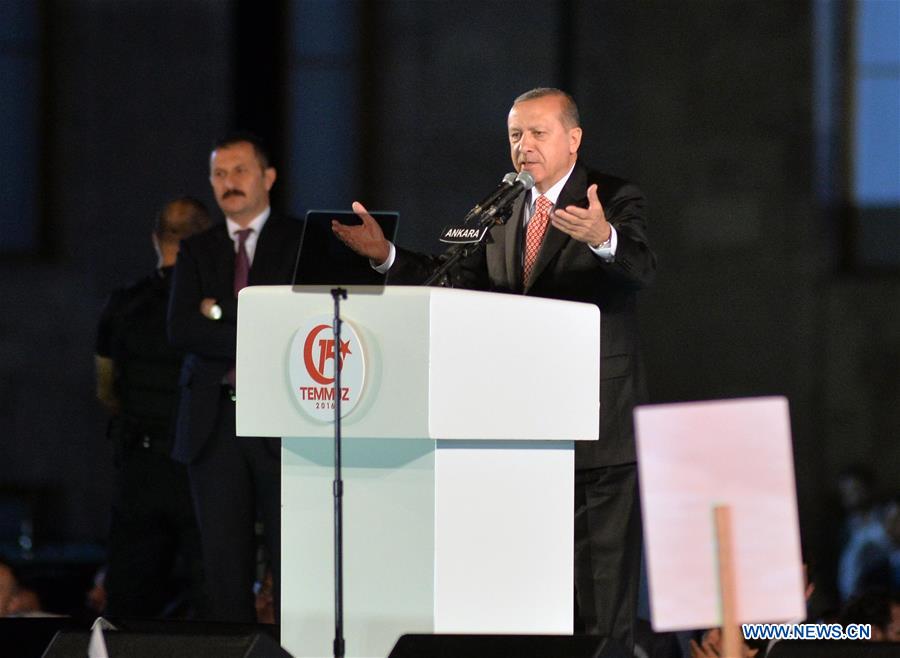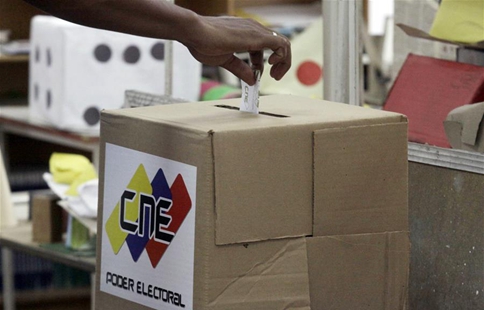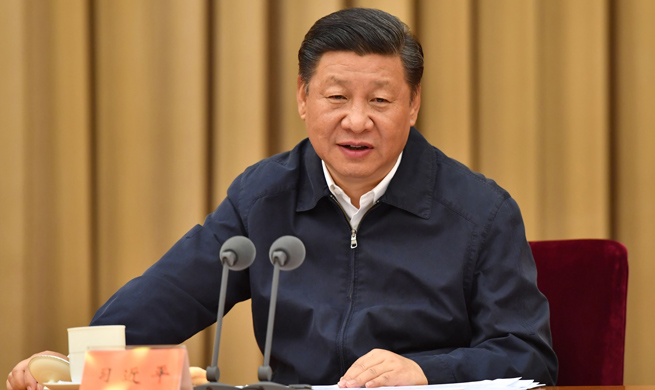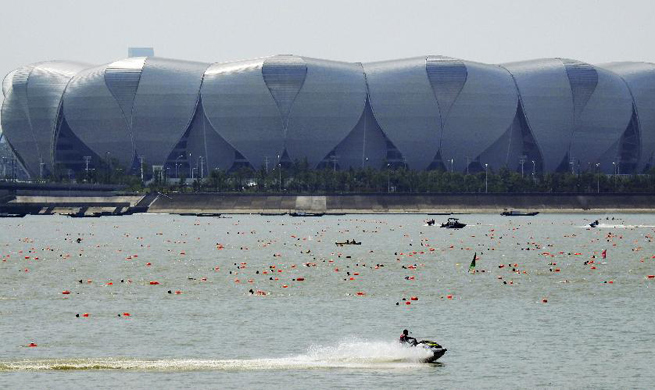
Turkish President Recep Tayyip Erdogan makes a speech during a ceremony marking the first anniversary of the defeat of an attempted coup in Ankara, capital of Turkey, July 16, 2017. Turkish President Recep Tayyip Erdogan early Sunday hailed the victory for defeating the military coup attempt last year, threatening to reinstate death penalty. (Xinhua/Mustafa Kaya)
by Burak Akinci
ANKARA, July 17 (Xinhua) -- Turkey marked on Sunday with a string of events in major cities the anniversary of a failed coup but tensions and divisions are still lingering in the NATO country because of sweeping crackdown against opposition circles.
Many events were organized in Ankara and Istanbul to commemorate the night of July 15, 2016, when thousands of unarmed civilians took to the streets to defy rogue soldiers who commandeered tanks and warplanes and bombed parliament in an unprecedented attempt to seize power.
With July 15 declared a national holiday in Turkey, President Recep Tayyip Erdogan went to Istanbul to join thousands making their way towards the Istanbul bridge over the Bosphorus, which divides the main city and economic hub.
Last year, crowds of civilians stood defiant in front of tanks and troops halting traffic between the city's European and Asian sides.
Some 250 people died and 2,000 others were wounded before the coup attempt was put down, a show of popular defiance that has likely ended decades of military interference in Turkish politics.
But the coup's greatest legacy and the dramatic events that shaped Turkey since then has further divided Turks between those who support Erdogan and those who don't.
Those against Erdogan and his ruling and conservative Justice and Development Party (AKP) also accused the dominant president of reshaping the secular atmosphere with his authoritarian and Islamist-rooted politics.
In the aftermath of the coup attempt, Turkey declared a state of emergency that has been in place ever since.
Some 140,000 people have been sacked or suspended from jobs in the civil service and private sector and more than 50,000 were detained for alleged links to U.S.-based cleric Fethullah Gulen, who Ankara believes to be behind the failed coup.
In the latest government decree published Friday evening, nearly 7,400 more state employees were fired, including teachers, academics, military and police officers.
The government calls the crackdown necessary to purge state institutions of those linked to Gulen, but critics say the dismissals are arbitrary.
"The state of emergency will have to stay in effect until the traitors of this heinous network are obliterated, we have an obligation to do this, there is simply no other way," said on Tuesday an AKP official to Xinhua on condition of anonymity.
He also called on the United States to extradite Gulen who lives in Pennsylvania since 1999. The U.S., as most of the European countries, thinks that more evidence is needed to link the coup attempt to his supporters, infuriating the Ankara government and causing an anti-Western sentiment in the country.
"Those who say that they are not convinced are our allies. It is really frustrating to be at a point of trying to prove that a thief that has entered your home, stole your belongings and fled, is really a thief. But we are determined to get him (Gulen) back in Turkey and to put him on trial for the crimes that he committed," added the AKP source.
The U.S. State Department on Saturday issued a statement praising the bravery of the Turkish people who took to the streets to "preserve the rights and freedoms of their democratic society."
Critics, including rights groups and some western governments, say Erdogan is using the state of emergency introduced after the coup to target all opposition figures and not only Gulen followers.
Gulen has led a long running campaign to overthrow the Turkish state through the infiltration of public institutions, particularly the army, police and judiciary, forming what the government has called the "parallel structure."
Some 13 lawmakers mostly from the pro-Kurdish Peoples' Democratic Party have been arrested and imprisoned under a controversial terrorist act.
The main opposition Republican People's Party has been most vocal on the continuing crackdown and its chief, Kemal Kilicdaroglu, lead a vibrant and much followed march from Ankara to Istanbul to decry the "authoritarianism" of President Erdogan's regime, ruling Turkey since 2002.
Hundreds of people were surprised because authorities found a certain messaging app on their phones, one the government says the coup plotters used.
Secular teachers and academics have also been fired.
Utku Doganay, a professor at the Faculty of Communications of the Ankara University has been expelled with dozens of colleagues in February for having signed a "Peace Declaration" urging the government to return to the negotiation table in order to find a solution to the Kurdish conflict that lingers since 1984 and has flared up again since 2015.
Since then she has no job and no passport and thus cannot travel or work abroad where she had job offers. The expelled academics also lost retirement accounts and the right to ever hold a job in the public sector.
"It's very difficult on a personal basis and also on a professional one. They robbed me the right of teaching my students in the middle of the class year," she said to Xinhua.
"All I did is to sign a piece of paper calling on the government to act for peace. And one morning I found myself, with others, without a job and an income. The only thing that I know is to teach and I am not permitted to do it," said the expelled academic.
A special parliamentary commission that is supposed to deal with tens of thousands of complaints from coup crackdown victims has recently started to work but experts think it's too late and will eventually not be able to screen every case in the years to come.
The Turkish parliament extended on Monday the state of emergency for another 3 months according to the government's wishes. No firm date has been given on when it will be lifted.
















